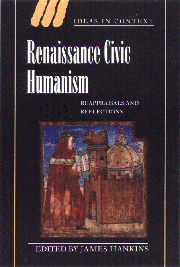Book contents
- Frontmatter
- Contents
- List of contributors
- Introduction
- 1 The republican idea
- 2 “Civic humanism” and medieval political thought
- 3 Civic humanism and Florentine politics
- 4 The two myths of civic humanism
- 5 Rhetoric, history, and ideology: the civic panegyrics of Leonardo Bruni
- 6 De-masking Renaissance republicanism
- 7 Civic humanism, realist constitutionalism, and Francesco Guicciardini's Discorso di Logrogno
- 8 Bruni and Machiavelli on civic humanism
- 9 Rhetoric, reason, and republic: republicanisms – ancient, medieval, and modern
- 10 Situating Machiavelli
- Index of manuscripts and archival documents
- General index
- Ideas in context
1 - The republican idea
Published online by Cambridge University Press: 06 October 2009
- Frontmatter
- Contents
- List of contributors
- Introduction
- 1 The republican idea
- 2 “Civic humanism” and medieval political thought
- 3 Civic humanism and Florentine politics
- 4 The two myths of civic humanism
- 5 Rhetoric, history, and ideology: the civic panegyrics of Leonardo Bruni
- 6 De-masking Renaissance republicanism
- 7 Civic humanism, realist constitutionalism, and Francesco Guicciardini's Discorso di Logrogno
- 8 Bruni and Machiavelli on civic humanism
- 9 Rhetoric, reason, and republic: republicanisms – ancient, medieval, and modern
- 10 Situating Machiavelli
- Index of manuscripts and archival documents
- General index
- Ideas in context
Summary
In recent years, while the history of republicanism has become one of the most hotly contested subjects in the fields of American and English history, historians of the Italian Renaissance have been paying less and less attention to what was long a staple of our trade. The fortune of the vita civile, as it developed in the cities of medieval Italy and as it variously survived or perished during the Renaissance, was a central theme of most Italian histories written since the time of Sismondi. Of late, however, a number of scholars have denied the importance of the vita civile, and there has now developed a large body of historical writing on the Renaissance that pays little attention to it. Certainly, the patient philological work of Nicolai Rubinstein has continued to expand our knowledge of the changing political vocabulary of Florentine thinkers and statesmen. And Machiavelli remains as interesting as ever: although much of the best recent work on Machiavelli has focused on his rhetorical strategies rather than looking to his role in a longer republican tradition, or, in more precise ways, at the immediate historical context of The Prince and the Discourses. As an overall effort, however, few would disagree that the study of republican thought in Renaissance Italy has gone little beyond the point to which it was brought in the 1970s by an extraordinary group of mostly German and American scholars.
- Type
- Chapter
- Information
- Renaissance Civic HumanismReappraisals and Reflections, pp. 14 - 29Publisher: Cambridge University PressPrint publication year: 2000
- 7
- Cited by



